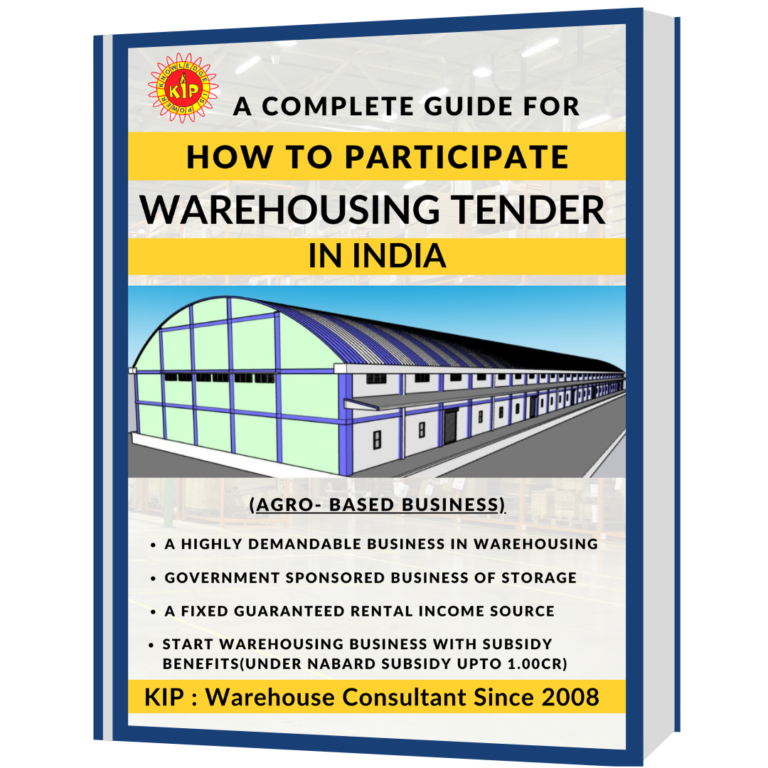- June 24, 2025
- admin
- 0 Comments
- Warehouse Business Opportunities
The Growing Opportunity in Warehousing Tenders in India
India’s total food grain production was around 311 million metric tons in 2021, but available storage capacity was only 145 million metric tons, indicating a shortage of approximately 166 million metric tons. This highlights a noticeable shortfall of about 53% in storage capacity. The annual food grain production exceeds 330 million tonnes as per 2023-24 data, further emphasizing the need for modern storage.
Key Agencies Inviting Warehousing Tenders
Several central and state agencies regularly invite tenders for warehousing infrastructure and services These include:
•Central Agencies:
- Central Warehousing Corporation (CWC): Provides warehousing infrastructure for food grains and other agricultural products and invites tenders for construction, operation, and maintenance.
- Food Corporation of India (FCI): Primarily responsible for procurement and storage of food grains, inviting tenders for storage and handling services at state and national levels. FCI also maintains buffer and strategic reserves for food security.
- Ministry of Agriculture & Farmers Welfare: Launches schemes and tenders for food grain storage and warehousing.
- National Cooperative Development Corporation (NCDC).
- Cotton Corporation of India (CCI): Invites tenders specifically for the cotton segment.
- National Agricultural Cooperative Marketing Federation of India Ltd (NAFED).
- National Cooperative Consumers’ Federation of India Ltd (NCCF).
- Tribal Cooperative Marketing Development Federation of India Ltd (TRIFED).
- Warehousing Development and Regulatory Authority (WDRA).
State Agencies:
- State Warehousing Corporations (SWCs): Each state has its own SWC (e.g., Punjab State Warehousing Corporation, Haryana State Warehousing Corporation), which releases tenders for state-level infrastructure. They also act as implementing agencies for FCI tenders.
- State-specific Cooperative and Grains Procurement Agencies: Examples include Haryana State Cooperative Supply and Marketing Federation (HAFED) and Punjab State Grains Procurement Corporation Ltd (PUNGRAIN).
Types of Warehousing Tenders
There are four primary types of warehousing tenders you can participate in:
A. New Godown under PEG Scheme (Private Entrepreneur Guarantee Scheme): This involves constructing new covered storage facilities on your private land. Tenders generally come with guaranteed agreements for 5, 7, or 10 years, ensuring a minimum rent.
B. PWS Tender (Private Warehousing Scheme): This is for already constructed godowns that you wish to lease to central or state procurement agencies. These tenders are typically valid for 2 or 3 years with re-tendering opportunities.
C. AMP Tender (Asset Monetization Policy of FCI): In this model, you construct a godown on FCI’s land. The land ownership remains with FCI, and you receive income based on usage for a 10-year agreement. After 10 years, ownership transfers to FCI.
D. Silo Project: These are tenders for advanced steel-based vertical storage facilities (silos), with agreements lasting 30 years or more. This is a highly prospective future demand, with FCI planning tenders for silo warehouses at 249 locations across the country.
Modes of Warehousing Services (Rental Income)
When offering warehousing services, there are different modes for rental income:
- Lease Only: You construct the warehouse and lease it to an agency for a fixed monthly rental income, similar to renting out property. The agency handles storage and maintenance, and your income is not affected by the volume of goods stored.
- Lease with Services (LWS): This mode includes Preservation, Maintenance, and Security (PMS) services in addition to leasing the facility. You are responsible for the maintenance and security of stored food grains and receive PMS charges (approx. ₹28 per ton per month from FCI, with annual increments), which provides extra income. Parties offering LWS are often preferred.
- Actual Utilization Basis (AU Based): Payment is based on how much storage capacity is actually utilized.
- Guaranteed Base: You receive a fixed rental income regardless of storage usage; this is sometimes offered for short-term tenders.
Basic Eligibility Norms for Tenders :
Participating in warehousing tenders requires significant pre-planning and preparation.
- Land-Related Norms:
- Ownership Modes: You can participate if you own the land, take it on a registered lease (typically 10-13 years), or intend to lease or buy after tender allotment (provided the land is properly identified).
- Suitability of Land: Must be within 8-15 km of the nearest grain market (Anaaj Mandi) or railway station (rail-connected or road-connected sites).
- Connected by a road that is at least 22 feet wide.
- No petrol pumps, brick industries, or plastic industries within a 500-meter radius due to potential adverse effects on food grains.
- No high-voltage electricity wires (e.g., 11 KV) running overhead.
- Not located in a flood zone.
- Preferably at road level or higher (not low-lying).
- No water canals, drains, or streams running through or adjacent to the land.
Land Requirement for Covered Godowns:
- Minimum of 2 acres for a 5,000 MT facility.
- For every additional 5,000 MT, an extra 1.7 acres is needed.
- Example: 30,000 MT capacity requires at least 10.5 acres of land.
- Land Requirement for Silo Projects: Land requirements are generally lower than covered warehouses for the same capacity.
- Spoke Model (road-connected): 4 acres for 25,000 MT.
- Hub Model (railway-connected, with sidings): 15 acres for 25,000 MT.
Financial Prospects and Subsidy Benefits :
The warehousing sector offers attractive financial returns and government support:
- Estimated Returns (Standard Norms):
- Covered Godown: Construction cost approx. ₹5,000 – ₹6,000 per MT, rental income ₹80 – ₹100 per MT/month, payback period 6 – 8 years, estimated IRR 13% – 16%.
- Silo Project: Construction cost approx. ₹10,000 – ₹13,000 per MT, rental income ₹120 – ₹150 per MT/month, payback period 9 – 11 years, estimated IRR 15% – 18%.
- Subsidy Benefits Available:
- Stamp Duty Refund: Provisions exist in every state for the refund of stamp duty when buying land for warehousing.
- Refund of Conversion Fee: For land conversion to public use.
- Interest Subsidy under Agri Infra Fund (AIF): Subsidies on interest paid for bank loans.
- NABARD Capital Subsidy: Provides capital subsidies for godown construction, up to a maximum of ₹100 lakh for up to 5,000 MT storage capacity throughout India.
◦ State-Specific Subsidies: Many states offer their own policies, such as capital subsidies (e.g., Haryana Government and UP Govt. up to ₹5 crore) or investment subsidies through state GST refunds (e.g., Punjab Government).

Reach Us
Call Us : 8683898080
E-mail Us : sales@kipfinancial.com
KIP Financial Consultancy Pvt. Ltd.
DSB – 38, Red Square Market, Hisar – 125001 (HR)



Leave a Comment